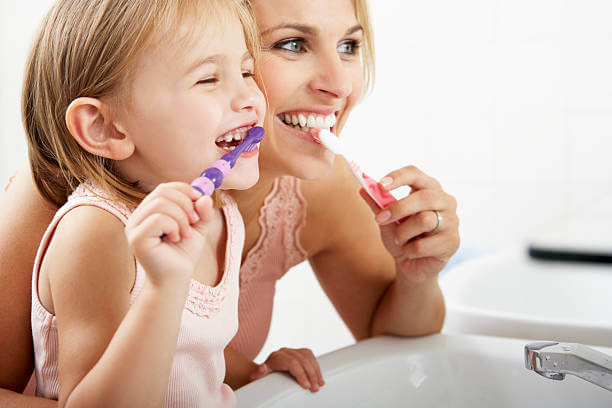
When thinking about your oral health, it’s important to consider regular dental cleanings. These visits to the dentist can keep your teeth and gums healthy, and they can also help catch any problems early on.
But how often should you have a professional cleaning? In general, dentists recommend an appointment every six months. However, if you have certain risk factors for gum disease or other issues with your teeth or gums, then your dentist may want to see you on a regular basis—even if it’s just for a quick check-up.
The American Dental Association (ADA) recommends that adult and children receive a comprehensive dental exam and prophylaxis (cleanings) once every six months. This includes scaling, polishing, root planing, and fluoride treatment. However, many factors determine how often you need to go to the dentist, and these include your age, general health status, diet, and whether or not you smoke.
While this is ideal for most patients, some need to have their teeh cleaned frequently. Patients at risk of gum disease, cavities, periodontal disease, or orthodontic problems will generally require frequent visits.

There are many reasons why you should get your teeth cleaned regularly. Aside from preventing cavities removing plaque and tartar, here are some reasons why you should schedule a dental appointment every six months:
The main disadvantage of getting more than two teeth cleanings a year is the out-of-pocket cost. Most dental insurance policies only cover two cleanings per year, but some insurance plans might cover more. Talk to your dentist to find out whether you would benefit from more frequent dental cleanings.
The teeth cleaning procedure may vary depending on the practitioner. However, there are some general steps involved in most visits. First, your dentist will ask you to sit in the chair so they can examine your teeth. They’ll ask about any recent changes in your dental health history, when your last dentist visit was, and whether you have any dental concerns. Depending on when the last x-rays were taken, the dental assistant will take X-rays to check for cavities, gum disease, tooth decay, and other issues. Your dentist will discuss their findings with you depending on what they find.
Cleaning – When your teeth are scaled (teeth cleaning), tartar and plaque are removed from the surface of your teeth. Your dentist or dental hygienist will scrape off plaque using special tools to reach areas of your mouth that are hard to clean.
Polishing – Next, your teeth are polished with a special toothpaste and specialized tool designed specifically for the job. This helps remove stains and polish your teeth to a gleaming white finish.
Fluoride treatment – To prevent tooth decay, dry mouth, and gum disease, you may be given a fluoride gel during your cleaning. At the end of your appointment, your dentist or dental hygienist will discuss proper dental hygiene and recommend products for keeping your mouth healthy at home.
At Sloan Creek Dental, the cost for a teeth cleaning is $199 for 2023, if you do not have dental insurance. At the national level, prices vary according to your dental practitioner, as well as the costs associated with living in different areas. A basic cleaning can cost anywhere between $100 and $250, depending on what type of work needs to be done. This includes things like scaling, polishing, fluoride treatments, sealants, whitening, etc.
In most cases, if you have dental insurance, it may cover most if not all of the cost, but there are times where there might be an out-of-pocket expense. Your insurer might require you to make a co-payment, and you’ll usually have to pay something extra for each additional cleaning you receive during the year. In addition, you may have to pay a deductible before benefits kick in. If you do not have dental insurance, contact your dentist to see if they have a dental membership plan to see if there is a more affordable option.
Brushing your teeth correctly twice per day is one of the easiest ways to maintain good oral hygiene. If you do brush incorrectly, you could actually damage your enamel and cause cavities. Here are three things to know about proper toothbrush techniques.
1. Brush for Two Minutes, Twice a Day – The American Dental Association recommends brushing for two minutes twice per day. You should start by cleaning around the gumline, moving towards the center of your mouth. Then move up to the molars and finish by cleaning the tongue.
2. Use Fluoride Toothpaste – Fluoride helps prevent tooth decay by making teeth more resistant to acid attacks and by preventing acid from destroying the enamel that protects teeth. It also helps remineralize areas of your teeth that have been weakened.
3. Floss Daily – Flossing is a key part of your oral hygiene routine, but it’s not always easy to do it right. Here are some tips to help you make sure you’re doing it right:
-Floss before brushing your teeth. It helps to get rid of food particles that might otherwise get stuck between your teeth and interfere with brushing.
-Use an 18″-24″ length of floss for each tooth, and wrap the floss around your middle fingers so that there is a little slack between them when you put them in between your teeth.
-Slide the floss up and down along one side of each tooth; this will help break up plaque and food debris.
-When you reach the gumline, curve the floss into a “C” shape around each tooth and slide it back down toward the bottom of that tooth—this will help clean beneath where you can’t reach with a toothbrush alone!
With a professional teeth cleaning, you decrease the chance of tooth loss due to plaque buildup and tooth decay. Regular teeth cleaning can help remove stains and dental plaque from your teeth, which makes them look whiter and brighter. When it comes to keeping your smile at its best, regular teeth cleaning is key!
Plaque is a type of bacteria that forms on your teeth every day. If it’s not removed by brushing, flossing, or from your dentist, it hardens into tartar. This buildup can cause inflammation in the mouth and gums, which leads to bad breath.
Yes, teeth cleanings are worth it.
Tooth decay is a silent disease that can wreak havoc on your teeth and gums without you ever knowing it. It starts with bacteria in your mouth attaching itself to the surface of your teeth, which creates plaque. The plaque becomes hardened into tartar, which then leads to tooth decay.
Not only is tooth decay painful, but it can also lead to gum disease and even heart disease if left untreated. Regular dental check-ups and cleanings are essential for preventing these serious health issues from occurring.
Tartar build-up is caused by plaque that forms on your teeth. Plaque is made of bacteria and food particles, and it can cling to your teeth and harden into tartar if it’s not removed regularly. Tartar can cause tooth decay and gum disease if left untreated.
In addition to plaque, tartar can also be caused by frequent snacking and drinking soda. The acids in soda make the enamel of your teeth more porous, which allows more plaque to stick to them. Foods with a lot of sugar—like cookies, candy, or cake—also contribute to tooth decay, as well as foods high in carbohydrates like breads and crackers. With proper oral care, you can prevent the buildup of tartar.
As your local general dentist near the Allen and Fairview area, we are here to help you with any questions or concerns that you might have about keeping your smile healthy. If you want to learn more about the teeth cleaning process, general dentistry, have questions about other dental services, feel free to contact us for a consultation appointment, and we’ll be happy to help with your smile goals. To schedule your initial consultation, contact Sloan Creek Dental, and our friendly staff will be happy to assist you. You can reach us at our Fairview, TX dental office to schedule an in-person consultation with us today – 972-468-1440.
Our dental office is located in Fairview, Texas, and our patients visit us from across the surrounding areas, including Allen, Plano, McKinney, and Lucas.

We firmly believe that the internet should be available and accessible to anyone, and are committed to providing a website that is accessible to the widest possible audience, regardless of circumstance and ability.
To fulfill this, we aim to adhere as strictly as possible to the World Wide Web Consortium’s (W3C) Web Content Accessibility Guidelines 2.1 (WCAG 2.1) at the AA level. These guidelines explain how to make web content accessible to people with a wide array of disabilities. Complying with those guidelines helps us ensure that the website is accessible to all people: blind people, people with motor impairments, visual impairment, cognitive disabilities, and more.
This website utilizes various technologies that are meant to make it as accessible as possible at all times. We utilize an accessibility interface that allows persons with specific disabilities to adjust the website’s UI (user interface) and design it to their personal needs.
Additionally, the website utilizes an AI-based application that runs in the background and optimizes its accessibility level constantly. This application remediates the website’s HTML, adapts Its functionality and behavior for screen-readers used by the blind users, and for keyboard functions used by individuals with motor impairments.
If you’ve found a malfunction or have ideas for improvement, we’ll be happy to hear from you. You can reach out to the website’s operators by using the following email
Our website implements the ARIA attributes (Accessible Rich Internet Applications) technique, alongside various different behavioral changes, to ensure blind users visiting with screen-readers are able to read, comprehend, and enjoy the website’s functions. As soon as a user with a screen-reader enters your site, they immediately receive a prompt to enter the Screen-Reader Profile so they can browse and operate your site effectively. Here’s how our website covers some of the most important screen-reader requirements, alongside console screenshots of code examples:
Screen-reader optimization: we run a background process that learns the website’s components from top to bottom, to ensure ongoing compliance even when updating the website. In this process, we provide screen-readers with meaningful data using the ARIA set of attributes. For example, we provide accurate form labels; descriptions for actionable icons (social media icons, search icons, cart icons, etc.); validation guidance for form inputs; element roles such as buttons, menus, modal dialogues (popups), and others. Additionally, the background process scans all of the website’s images and provides an accurate and meaningful image-object-recognition-based description as an ALT (alternate text) tag for images that are not described. It will also extract texts that are embedded within the image, using an OCR (optical character recognition) technology. To turn on screen-reader adjustments at any time, users need only to press the Alt+1 keyboard combination. Screen-reader users also get automatic announcements to turn the Screen-reader mode on as soon as they enter the website.
These adjustments are compatible with all popular screen readers, including JAWS and NVDA.
Keyboard navigation optimization: The background process also adjusts the website’s HTML, and adds various behaviors using JavaScript code to make the website operable by the keyboard. This includes the ability to navigate the website using the Tab and Shift+Tab keys, operate dropdowns with the arrow keys, close them with Esc, trigger buttons and links using the Enter key, navigate between radio and checkbox elements using the arrow keys, and fill them in with the Spacebar or Enter key.Additionally, keyboard users will find quick-navigation and content-skip menus, available at any time by clicking Alt+1, or as the first elements of the site while navigating with the keyboard. The background process also handles triggered popups by moving the keyboard focus towards them as soon as they appear, and not allow the focus drift outside of it.
Users can also use shortcuts such as “M” (menus), “H” (headings), “F” (forms), “B” (buttons), and “G” (graphics) to jump to specific elements.
We aim to support the widest array of browsers and assistive technologies as possible, so our users can choose the best fitting tools for them, with as few limitations as possible. Therefore, we have worked very hard to be able to support all major systems that comprise over 95% of the user market share including Google Chrome, Mozilla Firefox, Apple Safari, Opera and Microsoft Edge, JAWS and NVDA (screen readers), both for Windows and for MAC users.
Despite our very best efforts to allow anybody to adjust the website to their needs, there may still be pages or sections that are not fully accessible, are in the process of becoming accessible, or are lacking an adequate technological solution to make them accessible. Still, we are continually improving our accessibility, adding, updating and improving its options and features, and developing and adopting new technologies. All this is meant to reach the optimal level of accessibility, following technological advancements. For any assistance, please reach out to